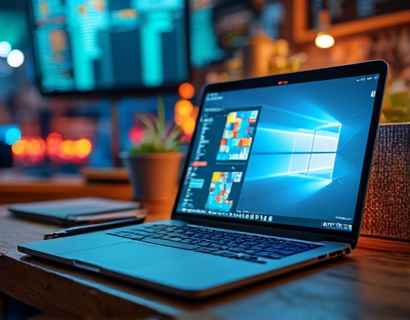Decentralized File Management: Transforming Business Collaboration with Secure and Efficient Online Solutions
In the rapidly evolving landscape of business collaboration, the need for secure and efficient file management solutions has become paramount. Traditional centralized file management systems often fall short in addressing the complexities of modern team dynamics, where collaboration spans across geographical boundaries and requires high levels of security and accessibility. This article delves into the transformative power of decentralized file management, exploring how cutting-edge online platforms are redefining the way businesses and teams handle their critical information.
Decentralized file management represents a paradigm shift from the conventional centralized models. In a decentralized system, data is not stored in a single location but is distributed across a network of nodes. This approach not only enhances security by eliminating a single point of failure but also improves accessibility and redundancy. For businesses and teams, this means that files can be accessed and shared seamlessly, regardless of the location or device used, without compromising on data integrity or security.
The core advantage of decentralized file management lies in its ability to provide a robust and resilient infrastructure. Unlike centralized systems where a server breach can lead to catastrophic data loss, decentralized networks distribute data across multiple nodes, making it extremely difficult for malicious actors to compromise the entire system. This distributed nature ensures that even if one node fails, the data remains safe and accessible through other nodes, thereby significantly reducing the risk of data loss.
One of the key challenges in implementing decentralized file management is ensuring a user-friendly interface that does not compromise on security or functionality. Modern online platforms have addressed this by developing intuitive interfaces that simplify the process of organizing, sharing, and collaborating on files. These platforms leverage advanced technologies such as blockchain, peer-to-peer networking, and encryption to provide a seamless user experience while maintaining the highest standards of data protection.
For businesses and teams, the transition to a decentralized file management system offers numerous benefits. Firstly, it enhances collaboration by allowing multiple users to access and work on files simultaneously without the need for cumbersome synchronization processes. This real-time collaboration capability is particularly valuable for remote teams and projects that involve multiple stakeholders across different time zones.
Moreover, decentralized file management platforms prioritize security, which is a top concern for businesses handling sensitive information. These platforms employ state-of-the-art encryption methods to protect data both in transit and at rest. Access controls are granular, allowing administrators to set precise permissions for different users and groups, ensuring that only authorized personnel can view or modify specific files. This level of control minimizes the risk of unauthorized access and data breaches.
Another significant advantage of decentralized file management is its scalability. As businesses grow and their data needs evolve, decentralized systems can easily scale to accommodate increased storage and user demands without the need for expensive hardware upgrades or complex infrastructure changes. This flexibility makes decentralized solutions an attractive option for businesses of all sizes, from startups to large enterprises.
In addition to security and scalability, decentralized file management platforms offer enhanced data integrity and consistency. Since data is stored across multiple nodes, any changes made to a file are immediately reflected across the network, ensuring that all users have access to the most up-to-date version. This eliminates the risk of working with outdated files and reduces the potential for errors and miscommunications.
The implementation of decentralized file management also aligns with the growing trend of digital transformation and the adoption of cloud-native technologies. As more businesses move their operations to the cloud, the integration of decentralized solutions becomes a natural extension, providing a hybrid approach that combines the benefits of both centralized and decentralized systems. This hybrid model offers the best of both worlds, leveraging the convenience and accessibility of the cloud while maintaining the security and control of decentralized storage.
For organizations looking to optimize their information management processes, the adoption of a decentralized file management platform is a strategic move. These platforms not only streamline file organization and sharing but also foster a culture of transparency and accountability within teams. By providing clear audit trails and version control, businesses can track changes and maintain a comprehensive history of file modifications, which is invaluable for compliance and regulatory purposes.
Furthermore, the ease of use of modern decentralized file management platforms means that employees do not need extensive training to adopt the new system. The intuitive interfaces and guided workflows ensure a smooth transition from traditional file management methods, reducing the learning curve and increasing adoption rates. This user-centric design philosophy is crucial for ensuring that the benefits of decentralized file management are fully realized across the organization.
The future of business collaboration is undoubtedly moving towards more decentralized and secure solutions. As technology continues to advance, we can expect further innovations in the field of decentralized file management, such as improved interoperability between different platforms, enhanced user privacy features, and more sophisticated AI-driven tools for data management. These advancements will continue to drive the adoption of decentralized solutions, making them an essential component of any forward-thinking business's technology stack.
In conclusion, decentralized file management offers a transformative approach to business collaboration, combining security, efficiency, and ease of use. By embracing this technology, businesses and teams can overcome the limitations of traditional centralized systems and unlock new levels of productivity and innovation. As the demand for secure and efficient file management solutions continues to grow, decentralized platforms will play a pivotal role in shaping the future of digital collaboration.











































